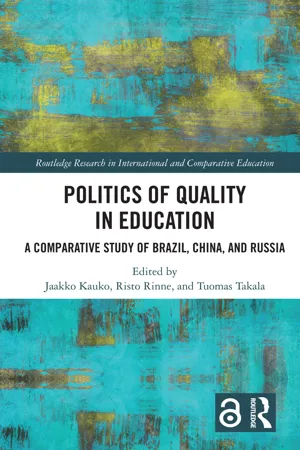
Politics of Quality in Education
A Comparative Study of Brazil, China, and Russia
- 208 pages
- English
- ePUB (mobile friendly)
- Available on iOS & Android
Politics of Quality in Education
A Comparative Study of Brazil, China, and Russia
About This Book
The question of quality has become one of the most important framing factors in education and has been of growing interest to international organisations and national policymakers for decades. Politics of Quality in Education focuses on Brazil, China, and Russia, part of the so-called emerging nations' BRICS block, and draws on a four-year project to develop a new theoretical and methodological approach.
The book builds a comparative, sociohistorical, and transnational understanding of political relations in education, with a particular focus on the policies and practices of Quality Assurance and Evaluation (QAE). Tracking QAE processes from international organisations to individual schools, contributors analyse how QAE changes the dynamics in the roles of state, expertise, and governance. The book demonstrates how national and sub-national actors play a central role in the adaptation, modification or rejection of transnational policies.
Politics of Quality in Education will be of great interest to academics, researchers and postgraduate students engaged in the study of comparative and international education, as well as educational policy and politics. It should also be essential reading for practitioners and policymakers.
The Open Access version of this book, available at https://www.taylorfrancis.com/books/e/9781351362528, has been made available under a Creative Commons Attribution-Non Commercial-No Derivatives 4.0 license.
Frequently asked questions
Information
Table of contents
- Cover
- Title
- Copyright
- Contents
- List of tables and figure
- Foreword
- Acknowledgements
- List of contributors
- Biographies
- 1 Comparing politics of quality in education
- 2 Layers of reflectivity in comparative research
- 3 Historical paths to shared interest in quality assurance and evaluation
- 4 Established and emerging actors in the national political arenas
- 5 Changing expertise and the state
- 6 Governance by data circulation? The production, availability, and use of national large-scale assessment data
- 7 Effects of quality assurance and evaluation on schools’ room for action
- 8 Alternative views of the future of quality assurance and evaluation
- 9 Conclusion
- Appendix 1: Interview data and codes
- Appendix 2: Coding of interviews
- Appendix 3: Interview guidelines
- Index